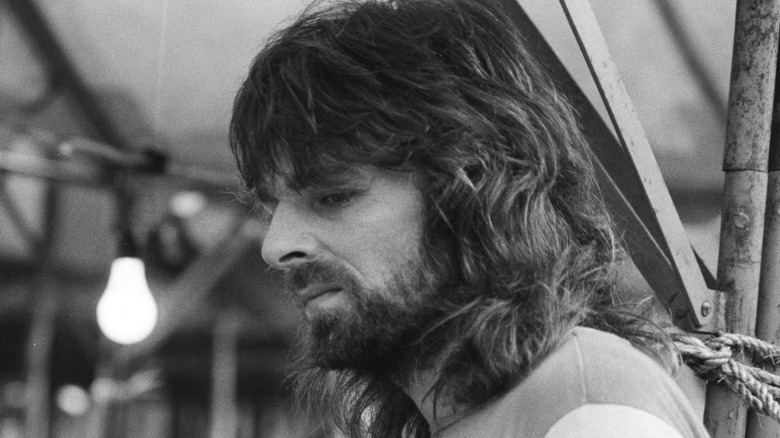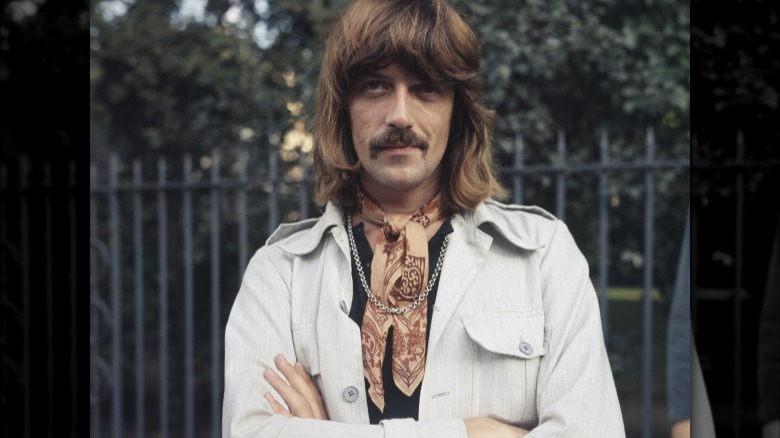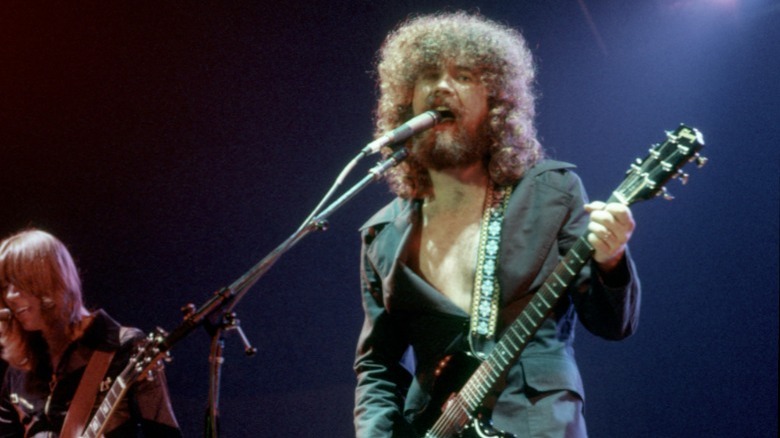Forgotten 1970s Musicians That You May Have Missed Died
In retrospect, it's easy to view the 1970s as one of the best decades in modern music history. With the groovy and bombastic '60s in the rearview mirror, the music of the '70s broke new ground while continuing the counterculture's rebellious spirit and attitude. Many bands, like Pink Floyd, The Who, and the Grateful Dead, were able to successfully transition from the '60s to the '70s and remain as popular as ever. Rock and roll still dominated the airwaves, though new genres like punk, heavy metal, and new wave — and even disco — also started to compete for radio play.
Sadly, there were many musicians who were never able to escape the excess of the 1970s. Rock gods like Jimi Hendrix, Janis Joplin, and Jim Morrison, all died before the decade even truly got underway, leaving behind legacies of legend, and sorrow. Now, five decades later, many more of the rock stars and legendary musicians of the 1970s have started to pass away with lamentable frequency, years after their prime. From Richard Wright to Gregg Allman and Ronnie James Dio, these are 1970s musicians whose deaths you may have missed.
Richard Wright
For many years until his passing, Richard Wright was the keyboardist for rock legends Pink Floyd. Wright was one of the original members of the band and was with them throughout virtually their entire existence. In the 1970s, Floyd released arguably their greatest string of albums. These included "The Dark Side of the Moon" in 1973, "Wish You Were Here" in 1975, "Animals" in 1977, and what many consider to be their magnum opus, "The Wall," in 1979.
Wright did not appear on the 1983 release "The Final Cut" after being let go from the band following "The Wall," but he did appear on Floyd's later 1987 and 1994 releases. He was also present at the Live 8 reunion in 2005. As The New York Times explained in their obituary of him, he shared songwriting credits on several songs and provided backup vocals. He also was a producer, sharing credit with bandmate David Gilmour on the 1970 album "Barrett," which was written by former Pink Floyd guitarist Syd Barrett. Wright also released two albums as part of a solo career.
Wright had three marriages and three children. He died in 2008 from cancer at the age of 65. He was an integral part of the Pink Floyd sound, and his work with them has sold more than 60 million copies. His death occurred just two years after former bandmate Syd Barrett, who had died in 2006.
John Entwistle
In late June 2002, just days before The Who was about to embark on a nationwide tour of the United States, tragedy struck the band. As reported by The New York Times, longtime bass player John Entwistle was discovered dead in his Las Vegas hotel room. Entwistle had been a founding member of the band, and had continued to play with them during their successive reunions following their original split in the early-1980s.
During their heyday in the 1960s and 1970s, The Who was one of the biggest rock bands in the world. Their performance at the 1969 Woodstock festival set the stage for their superstardom of the '70s, and they more than capitalized on their popularity. Their biggest release of the decade, the rock opera "Quadrophenia," sparked the release of a major motion picture — which the band helped produce — and immortalized their story on the big screen forever. During his career, Entwistle was also a significant collector of bass guitars, at one point acquiring and then auctioning off more than 200.
The Associated Press reported that Entwistle's death was a heart attack related to the use of cocaine. His longtime cigarette habit was also a contributing factor. He was just 57 years old at the time of his death.
If you or anyone you know needs help with addiction issues, help is available. Visit the Substance Abuse and Mental Health Services Administration website or contact SAMHSA's National Helpline at 1-800-662-HELP (4357).
Charlie Watts
For many young percussionists, Charlie Watts of The Rolling Stones was the reason they got into drumming. As an original member and backbone of the band from 1963 until his death in 2021, Watts is widely considered one of the greatest drummers in rock and roll history. As Rolling Stone reported in his obituary, he joined the band following the departure of their first drummer, Mick Avory. His unique sound instantly helped the band become a success on the back of early singles like "(I Can't Get No) Satisfaction."
Though they first became popular in the 1960s, their string of successful releases at the beginning of the 1970s are among the most storied in their huge discography. Starting with "Get Your Ya-Yas Out!" in 1970 and "Sticky Fingers" in 1971, the band then released "Exile on Main Street" in 1972, which remains one of their most popular albums today.
Watts stayed with the band through their several lineup changes and experimental periods, and he also had a solo career of his own, in which he primarily played jazz instead of rock and roll. He was married and had a daughter, and he owned several horses. After previously surviving a bout with throat cancer in the early 2000s, Watt died in 2021 at the age of 80. He had recently had to stop touring with the Stones leading up to his death, and passed just prior to the beginning of their "No Filter" tour.
Gregg Allman
Gregg Allman was most widely known for founding the Allman Brothers Band with his brother Duane Allman. He played both organ and performed vocals on many songs, and he was also the principal songwriter. Following the dissolution of the Allman Brothers, Allman released several solo albums, including the Grammy-nominated "Low Country Blues" in 2011.
Though the Allmans had started to perform as a band in the late-1960s, their popularity really took off in the 1970s following the release of the 1971 album "Live at the Fillmore East." The album captured their unique sound, which combined southern rock, psychedelia, and jam rock together. They first split in the 1970s, though they reunited several times between then and their final concert in 2014.
Gregg's brother Duane died in 1971 following a motorcycle accident. On May 27, 2017, the world lost a musical giant when legendary musician and songwriter Gregg Allman passed away. Allman died from complications due to liver cancer, and he was 69 years old at the time (as per The New York Times). He had overcome struggles with substance and alcohol abuse, and had already received a liver transplant a few years prior to his death. Gregg Allman left behind a wife and five kids when he passed.
If you or anyone you know needs help with addiction issues, help is available. Visit the Substance Abuse and Mental Health Services Administration website or contact SAMHSA's National Helpline at 1-800-662-HELP (4357).
Jon Lord
For many guitarists and musicians, undoubtedly, one of the first songs they learn is "Smoke on the Water" by Deep Purple. Its basic but potent rhythm, simple chord structure, and infinite repeatability make it one of the quintessential songs a young ax slinger can put in their arsenal. Unfortunately, on July 16, 2012, the world lost one of the musicians who wrote that song: keyboardist Jon Lord (as reported by The Washington Post).
Lord had originally taken up the piano as a kid. Later he was co-founder of Deep Purple, which came together in 1968, and besides "Smoke on the Water" he was also responsible for helping write several of their other hits. Lord was synonymous with the Hammond electric organ, which he used to amplify through massive Marshall guitar speakers. Deep Purple was incredibly influential for many musicians, and actually claims the honor of being the "world's loudest band." Lord also had a solo career and played with other bands, including Whitesnake and The Kinks.
His official cause of death was a pulmonary embolism, though he was also reportedly dealing with pancreatic cancer at the same time. Born in 1941 in England less than a month after "the Blitz" ended, Lord was 71 years old when he died.
Walter Becker
If there is one band whose music encapsulates the feelings, energy, and vibes of the 1970s, it has to be Steely Dan. Blending jazz and rock and roll together with lyrics that spoke about everything from the outlandish to the sensual, it's not hard to see why the band was at the top of the charts throughout the 1970s.
Led by Donald Fagen and Walter Becker since they first started to play together in 1972, the pair co-wrote all of Steely Dan's songs, including their massive 1970s hits "Reelin' In the Years," "Rikki Don't Lose that Number," and "Do It Again." And yes, the band was deliberately named after a sex toy from a William S. Burroughs book. They briefly split in the 1980s, during which time Becker released multiple solo albums, but by the 1990s they were back in full swing as if they had not missed a beat. Steely Dan was still active less than a year before Becker's death and had previously been inducted into the Rock and Roll Hall of Fame.
Becker passed away from esophageal cancer in 2017 at the age of 67 years old (according to The New York Times). Becker and Fagen were close until Becker's passing, and his widow revealed that he had died just four months after first being diagnosed with cancer (per Rolling Stone).
Allen Lanier
In the 1970s, few could do better if they wanted good and heartfelt rock and roll than to look to Blue Öyster Cult. Bursting onto the scene in the early 1970s, BÖC are the authors behind one of the most famous songs in rock history, "(Don't Fear) the Reaper," which was famously parodied in the iconic "Saturday Night Live" sketch featuring Will Ferrell. Allen Lanier was one of the founding members of BÖC (via Rolling Stone).
Lanier was a member of BÖC from 1972–1985, and again from 1987–2006 after a brief hiatus. In the 1970s alone, BÖC put out eight albums, of which Lanier's guitar and keyboards were an integral part. Several of their albums were certified gold during the decade, and many of them also broke into the Top 100 and even the Top 40. During his career, Lanier not only was not only an integral part of BÖC, but he also recorded with legends like Patti Smith, Iggy Pop, and Jim Carroll. He and Smith were also in a serious relationship, for a time, and their breakup devastated him.
The musician died on August 14, 2013, when he was 67 years old. The cause of Lanier's death was chronic obstructive pulmonary disease.
Dusty Hill
Always memorable due to his black plastic sunglasses, a fist full of rings, and of course, massive beard, the world will forever mourn the passing of former ZZ Top bass player Dusty Hill. Hill died on July 27, 2021, leaving behind bandmates Billy Gibbons and Frank Beard to continue ZZ Top alone (as reported by Rolling Stone). Hill was 72 years old when he died, and he was one of the most beloved musicians of his era.
If there was an award for the coolest rock and roll band of the 1970s, ZZ Top would have practically no competition for the top crown. Their aptly named debut album, "ZZ Top's First Album," came out in 1971 and featured Hill on the bass. He appeared on every other album during their career, and was inducted into the Rock and Roll Hall of Fame with them in 2004. ZZ Top and Hill had some of their biggest hits in the 1970s, including "La Grange" in 1973 and 1979's "Cheap Sunglasses."
At first, the cause of Hill's death was not released, but Gibbons addressed it during an interview with Variety a few months later. A specific cause of death was not given, but Gibbons detailed some of the health struggles Hill had dealt with leading up to his passing, including a broken shoulder and broken hip. Ultimately, Hill died of natural causes in his sleep, leaving the rock and roll world a little bit less cool than it had been since 1971.
Neil Peart
Since he joined Rush in 1974, Neil Peart was widely regarded as one of the most technically precise and innovative drummers in rock and roll history. He was constantly considered in the top echelon by his peers and fellow drummers, but he was much more than just a percussionist. He influenced generations of younger drummers who looked up to him as a legend, and he contributed to other areas of the rock world, too. He came up with lyrics to many of Rush's songs, was a music producer, and even a published author several times over.
According to NPR, some of Peart's lyrics were influenced by real-life events, like the Second World War, but science fiction was also a prominent theme. He was known for having an absolutely massive drum kit, including many cymbals, and he combined complete technical precision with fun and laughter. In 2013, in recognition of their impact, Peart and the rest of Rush were inducted into the Rock and Roll Hall of Fame.
Peart experienced serious tragedy in his life, including the death of his daughter Selena and wife Jackie in successive years in the late-1990s (via Rolling Stone). He was diagnosed with brain cancer in 2016, and he died on January 7, 2020. He was 67 years old at the time of his death, and he had largely stopped playing live since 2015.
Ric Ocasek
Though they may have come at the tail-end of the decade, for many, Ric Ocasek and The Cars are still synonymous with the sounds of the 1970s. Their eccentric style was showcased on their 1978 debut album, which introduced hordes of fans to a brand new style of music to be known as New Wave. By the 1980s, The Cars and Ocasek were huge successes, but they were not long for the rock and roll world and did not make it out of that decade.
Still, Ocasek stuck with music, producing numerous albums for bands like Wheezer and Bad Brains. In 2010, Ocasek briefly resurrected The Cars for another album, and in 2018 they made it into the Rock and Roll Hall of Fame. Even while a member of The Cars, Ocasek was releasing solo albums, and he also made spoken word recordings.
Ocasek was married to his third wife, model Paulina Porizkova, for more than 30 years, and he also left behind six children, all of them boys. Ocasek died on September 15, 2019, and his official cause of death was heart disease (via Rolling Stone).
Brad Delp
Brad Delp and Boston originally debuted in 1976, and soon established themselves as one of the top-billed acts in rock and roll. Powered by soaring guitar harmonies and Delp's ultra-powerful and unique voice, Boston's first two albums, "Boston" in 1976 and "Don't Look Back" in 1978, are still two of the most popular in their entire catalog.
Though he briefly left in the early-1980s and mid-1990s, he had been back with the band since 2002. Originally from Danvers, Massachusetts, it was Delp's falsetto voice that gave Boston one of the most unique sounds in pop rock, and helped transform the music into radio-friendly ballads. His vocals appear on the 2013 Boston album "Life, Love & Hope," which was recorded just prior to his passing (via Britannica). In addition to playing in Boston, Delp also performed in the cover band Beatle Juice, who played Beatles songs, prior to his death (via The New York Times).
While at first, the details of his 2007 death were a mystery, eventually the shocking truth came out. Delp had died by suicide at the age of 55 (via Guitar World). He left behind several notes to his family, including his fiance at the time.
If you or anyone you know is having suicidal thoughts, please call the National Suicide Prevention Lifeline by dialing 988 or by calling 1-800-273-TALK (8255).
Ronnie James Dio
If Elvis Presley was the "King of Rock and Roll," then Ronnie James Dio surely must have been the "Overlord of Metal." Known for his tenure in Rainbow and Black Sabbath in the 1970s, Dio's voice was long one of the most powerful in the entire rock and roll and metal genres. He began his solo career under the moniker Dio in the 1980s after leaving Sabbath, of which he is probably most well known for the 1983 single "Holy Diver." He also had a memorable role playing himself in the 2006 film "Tenacious D in The Pick of Destiny."
Dio was 67 years old when he died due to stomach cancer in Los Angeles, California, where he was surrounded by his family, including his longtime wife Wendy Dio (via Rolling Stone). Prior to his death, Dio had been canceling shows due to his illness, and reportedly underwent seven chemotherapy sessions.
His passing was met with an outpouring of love from many within the metal community, who praised not only his incredible vocal chops and lyrical prowess but also his musical impact and personal warmth.












